人教7年级下册 Unit 6 语法讲解
2019春七年级英语下册Unit6I’mwatchingTV语法专练课件新版人教新目标版

ppt课件
7
ppt课件
5
Ⅱ.按要求完成句子,每空一词 1.Jack cleans the blackboard every day.( 用now改写句子 ) Jack is cleaning the blackboard now. 2.I’m listening to the radio.( 改为一般疑问句 )
makemakingtaketaking以重读闭音节结尾且末尾只有一个辅音字母的动词先双写这个辅音字母再加ing
Unit 6 I’m watching TV.
ppt课件
1
现在进行时( 一 )
1.定义:表示现在或者现阶段正在进行的动作或存在的状态。
2.句型结构。
( 1 )肯定句:主语+be( am/is/are )+现在分词+其他。例如:
肯定回答:Yes,主语+be( am/is/are )。
否定回答:No,主语+be( am/is/are )+not。例如:
—Are they shopping?她们在购物吗?
—Yes,they are./No,they are not/aren’t.是的,她们在购物。/不,她们不在购物。
ppt课件
ppt课件
3
4.现在分词的构成规律。 ( 1 )一般情况下在动词末尾加-ing。例如: read→reading,work→working ( 2 )以不发音字母e结尾的动词,去e再加-ing。例如: make→making,take→taking ( 3 )以重读闭音节结尾,且末尾只有一个辅音字母的动词,先双写这个辅音字母,再加-ing。 例如: put→putting,stop→stopping,begin→beginning
人教PEP七年级下册英语Unit6单元重点语法2022

Unit6单元重点语法满招损,谦受益。
《尚书》原创不容易,【关注】,不迷路!现在进行时(一)1.现在进行时主要用于表示现在正在进行的动作,有时也可表示现阶段在进行的动作。
例句:Look!Twatc;is;are)动词的形式要和主语保持一致。
例句:Tswimmingstopstoppingshopshoppinggetgetting以ie结尾的动词变为现在分词时,要把ie变为y再加-ing。
例如:diedying,lielying。
现在进行时态的构成:进行时很好记,be+v.-ing;分词构成需注意,直接双写,去掉e。
4.现在进行时态的基本句型:(1)肯定式:be+v.-ing例句:Sheiswashingtheclothesnow.她现在正在洗衣服。
(2)否定式:be+not+v.-ing例句:Sheisn'twashingtheclothesnow.她现在没在洗衣服。
(3)一般疑问句:be动词提前例句:—Isshewashingtheclothesnow?她现在正在洗衣服吗?—Yes,sheis./No,sheisn't.是的,她在洗衣服。
/不,她没在洗衣服。
(4)特殊疑问句:疑问词+be+主语+doing+其他?—Whatisshedoing?她正在做什么?—Sheiswashingtheclothesnow.她现在正在洗衣服。
【素材积累】不要叹人生苦短,若把人一生的足迹连接起来,也是一条长长的路;若把人一生的光阴装订起来,也是一本厚厚的书。
开拓一条怎样的路,装订一本怎样的书,这是一个人生命价值与内涵的体现。
有的人的足迹云烟一样消散无痕,有的人却是一本耐读的厚书,被历史的清风轻轻翻动着,给一代又一代的人以深情的启迪与深刻的昭示。
(完整版)人教版七年级英语下册unit6(详细内容)(最新整理)
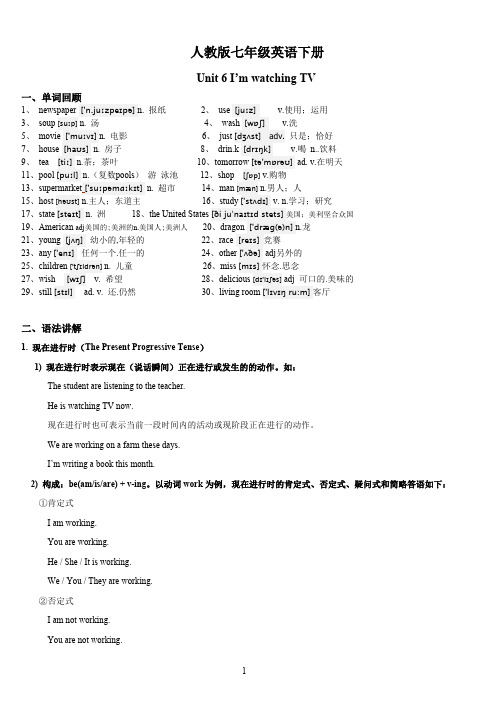
人教版七年级英语下册Unit 6 I’m watching TV1、报纸2、use [juːz]v.使用;运用3、4、wash [wɒʃ]v.洗5、6、just [dʒʌst]adv.只是;恰好7、8、drin.k [drɪŋk]v.喝n..饮料9、tea 10、tomorrow [tə'mɒrəʊ] ad. v.在明天11、游泳池12、shop [ʃɒp] v.购物13、超市14、man [mæn] n.男人;人15、16、study ['stʌdɪ] v. n.学习;研究17、the United States [ði juˈnaɪtɪd stets]美国;美利坚合众国19、adj美国的;美洲的n.美国人;美洲人20、dragon ['dræg(ə)n]n.龙21、young [jʌŋ]幼小的,年轻的22、race [reɪs]竞赛23、any ['enɪ]任何一个.任一的24、other ['ʌðə] adj另外的25、children ['tʃɪldrən] n. 儿童26、miss [mɪs]怀念.思念27、wish [wɪʃ]v. 希望28、delicious [dɪ'lɪʃəs] adj 可口的.美味的29、still [stɪl]ad. v. 还.仍然30、living room ['lɪvɪŋ ru:m]客厅二、语法讲解1. 现在进行时(The Present Progressive Tense)1) 现在进行时表示现在(说话瞬间)正在进行或发生的的动作。
如:The student are listening to the teacher.He is watching TV now.现在进行时也可表示当前一段时间内的活动或现阶段正在进行的动作。
We are working on a farm these days.I’m writing a book this month.2) 构成:be(am/is/are) + v-ing。
2019-2020年人教版英语七年级下册Unit6 I'm watching TV单元知识点(含习题
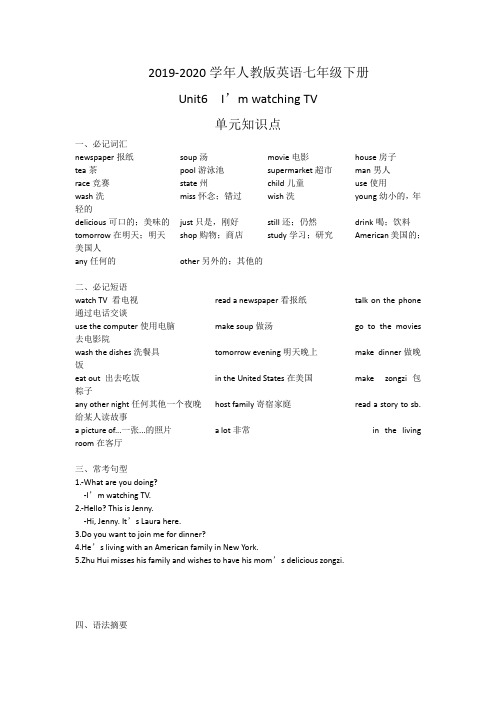
2019-2020学年人教版英语七年级下册Unit6 I’m watching TV单元知识点一、必记词汇newspaper报纸soup汤movie电影house房子tea茶pool游泳池supermarket超市man男人race竞赛state州child儿童use使用wash洗miss怀念;错过wish洗young幼小的,年轻的delicious可口的;美味的just只是,刚好still还;仍然drink喝;饮料tomorrow在明天;明天shop购物;商店study学习;研究American美国的;美国人any任何的other另外的;其他的二、必记短语watch TV 看电视read a newspaper看报纸talk on the phone 通过电话交谈use the computer使用电脑make soup做汤go to the movies 去电影院wash the dishes洗餐具tomorrow evening明天晚上make dinner做晚饭eat out 出去吃饭in the United States在美国make zongzi包粽子any other night任何其他一个夜晚host family寄宿家庭read a story to sb.给某人读故事a picture of...一张...的照片 a lot非常in the living room在客厅三、常考句型1.-What are you doing?-I’m watching TV.2.-Hello? This is Jenny.-Hi, Jenny. It’s Laura here.3.Do you want to join me for dinner?4.He’s living with an American family in New York.5.Zhu Hui misses his family and wishes to have his mom’s delicious zongzi.四、语法摘要重点:现在进行时的定义、结构、标志词及动词ing形式的变化规则。
人教版英语七年级下册单元Unit6知识点+测试卷+思维导图

⼈教版英语七年级下册单元Unit6知识点+测试卷+思维导图Unit 6 I’m watching TV.1.重点词汇:newspaper, movie, tea, house, pool, supermarket, living room, race, wash, drink, study, miss, wish, young, delicious2.短语归纳:1.watch TV 看电视2. read a newspaper 看报纸3. talk on the phone 通过电话交谈4. listen to music 听⾳乐5. use the computer 使⽤电脑6. make soup做汤7. wash the dishes 洗餐具8. kind of 有点⼉3. 必背典句:1. —Why are you doing? 你在做什么?—I’m watching TV. 我在看电视。
2. —What’s she doing? 她在做什么?—She’s washing her clothes. 她在洗她的⾐服。
3. —What are they doing? 他们在做什么?—They’re listening to a CD. 他们在听⼀张CD 唱⽚。
4. —Are you doing your homework? 你在做你的家庭作业吗?—Yes, I am. / No, I’m not. I’m cleaning my room.是的,我在做。
/ 不,我没有。
我在打扫我的房间。
5. Zhu Hui misses his family and wishes to have his mom’s delicious zongzi.朱辉思念他的家⼈并希望吃上他妈妈的可⼝粽⼦。
4.语法知识:现在进⾏时1.定义:表⽰现在或现阶段正在进⾏的动作。
常与now, these days等时间状语连⽤,句⾸有Look ! / Listen !等提⽰语。
人教版七年级下Unit6知识点+练习(无答案)预习版

U6: I’m watching TV.一、重点词汇讲解1.watch TV 看电视watch, see, look, read这四个词的区别:1)watch 意为“观看、注视”。
指长时间看某一活动的场面,如:看电视、比赛、表演、赏月等。
He likes watching TV. 他喜欢看电视。
2)look 强调发出看的动作,不注重结果。
是一个不及物动词,带宾语时加at。
如:Look. There is a boy under the tree. 看,树下有一个男孩。
Please look at the blackboard. 请看黑板。
3)see 强调“看”的结果。
指看见还是没看见。
也指看电影(see a comedy)、看病(seea doctor)如:I can see some birds in the tree. 我能看见树上有一些鸟。
4)read 意为“看、读”。
其宾语常是有文字的“书、报、杂志”等。
如:He is reading a book. 他正在看书。
体会下边的话:看,大卫正在看黑板。
他能看见一位女孩在看书,她没有看电视。
Look. David is looking at the blackboard. He can see a girl. She is reading books. She isn’t watching TV.2.clean 1) 形容词。
“干净的”如:The desk is clean. 桌子很干净。
2)动词。
“扫除、清除”。
如:He is cleaning his room.他正在打扫房间3.eat dinner 吃晚饭4.talk on the phone. 在电话上交谈。
注意用介词on.5.want to do sth 想要做某事。
6.go to the movies 去看电影。
7.That sounds good. 那听起来不错。
show 电视节目。
人教七年级下册英语第六单元unit6语法解析
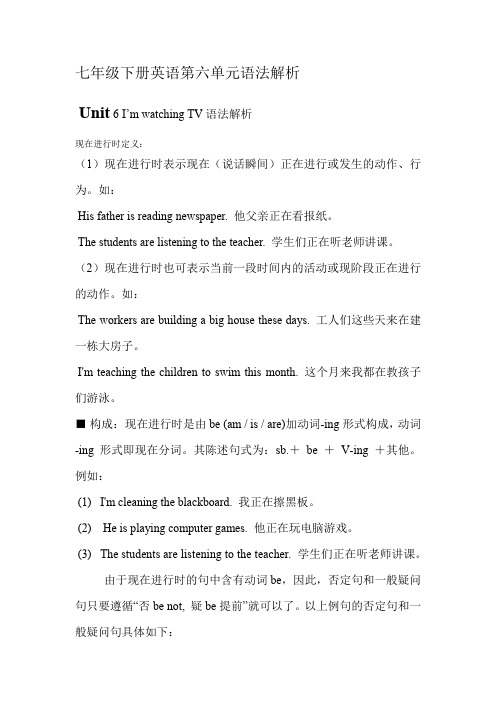
七年级下册英语第六单元语法解析Unit 6 I’m watching TV语法解析现在进行时定义:(1)现在进行时表示现在(说话瞬间)正在进行或发生的动作、行为。
如:His father is reading newspaper. 他父亲正在看报纸。
The students are listening to the teacher. 学生们正在听老师讲课。
(2)现在进行时也可表示当前一段时间内的活动或现阶段正在进行的动作。
如:The workers are building a big house these days. 工人们这些天来在建一栋大房子。
I'm teaching the children to swim this month. 这个月来我都在教孩子们游泳。
■构成:现在进行时是由be (am / is / are)加动词-ing形式构成,动词-ing形式即现在分词。
其陈述句式为:sb.+be +V-ing +其他。
例如:(1)I'm cleaning the blackboard. 我正在擦黑板。
(2)He is playing computer games. 他正在玩电脑游戏。
(3)The students are listening to the teacher. 学生们正在听老师讲课。
由于现在进行时的句中含有动词be,因此,否定句和一般疑问句只要遵循“否be not, 疑be提前”就可以了。
以上例句的否定句和一般疑问句具体如下:(1)I'm not cleaning the blackboard. 我不在擦黑板。
Are you cleaning the blackboard? 你在擦黑板吗?(2)He's not playing computer games. 他不在玩电脑游戏。
Is he playing computer games? 他在玩电脑游戏吗?一般现在时和现在进行时的区别一、概念不同:一般现在时表示主语经常性和习惯性的动作或存在的状态,也表示说话者的能力及自然现象。
人教版初中英语七年级下册Unit6语法指导与练习

人教版初中英语七年级下册Unit6语法指导与练习Unit 6 I’m watching TV.Unit 6语法指导与练习语法指导现在进行时【教材原句】1.——What are you doing?——I’m watching TV.2. ——Is the man swimming in a river?——No,he isn’t.He’s swimming in a pool.3.Are you doing your homework?4.He’s playing basketball.以上例句,均是(时态)的句子,句子的谓语是由助动词be(、、)+v.-ing(动词的现在分词)构成的。
(现在进行时,am,is,are)【语法透析】一、现在进行时的用法。
1.现在进行时可以表示说话时正在进行着的动作,常与now,right now,at the moment等时间状语及动词look,listen等连用。
例如:He is watching TV now.他现在正在看电视。
Look!They are playing soccer.看!他们在踢足球。
2.现在进行时可以表示目前一段时间内一直进行的动作,常和these days,this week,at present等时间状语连用。
例如:They are working on a farm these days.这些天他们在农场里干活。
3.现在进行时可以表示现在不断发展变化的事情。
表示渐变的动词有:get,grow,turn,become等。
例如:The leaves are turning yellow.叶子变黄了。
The days are getting shorter and shorter.白天正变得越来越短。
4.与副词always, constantly等连用,表示反复出现或习惯性的动作,含有说话者赞扬、不满、讨厌、遗憾等情绪。
例如:She’s always smiling happily. Tom is always making the same mistake! 二、现在进行时的构成。
Unit 6 单元知识点总结课件--七年级英语下册(人教版)
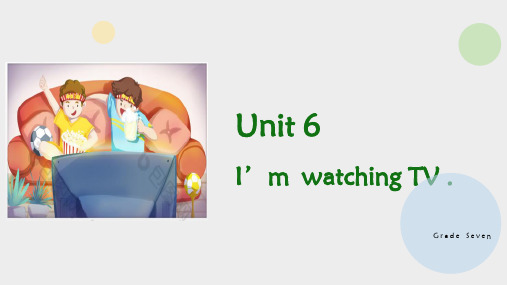
A.She is washing the clothes
B.She often washes the dishes
C.She exercises
D.She goes to the movies
3.—Is she doing her homework? —________.
A.Yes, she is B.No, she is
单项选择
1.I don’t understand what you said. Would you please give me ________
example?
A.another
B.other
C.others
D.the other
2.Some students are running around the lake and ________ students are
2.7 other
other意为“另外的,其他的”,常修饰可数名词复数,作定语 【辨析】other,the other,others,the others与another
有数量限制(特指) 没有数量限制(泛指)
(空)后面没有名词 the others others
(空)后面有名词 the other other
Be+主语+现在分词+其他?
例句 Look! Sam is watching TV happily on the sofa. 看!萨姆正在沙发 上高兴地看电视。
They are not playing basketball now. 他们现在没有在打篮球。
Are the children flying kites in the park?孩子们正在公园里放风筝 吗?
人教 七 下 Unit 6 - grammar vocabulary 讲解

Unit 6 I’m watching TV.(同步语法讲解)语法一、现在进行时用法:表示正在进行的动作及常见的时间状语现在进行时表示正在进行的动作或存在的状态。
现在进行时表示动作发生的时间是“现在”,动作目前的状态是“正在进行中”。
1、当句中出现表示时间的词now,at the moment等时,表示句子要说明的是动作此刻正在发生,句子应用现在进行时。
例如:Linda's brother is watching TV in his bedroom now.2、当句中出现时间状语these days,this week,this month,this term 等时,如果句子所要表达的意义是在这一阶段正在发生的事,则动词应用现在进行时。
例如:These days we are helping the farmers work on the farm.3、当句中出现Look!Listen!Can't you see? 等具有暗示意义的表达,说明后句中的动作正在发生,该句应用现在进行时。
例如:Look! Maria and Tom are dancing under the tree.4、注意根据上下文的暗示,句子可能应用现在进行时。
例如:- Where is Mr. Wang?-Oh, he is reading a newspaper in the office.-Is that boy Jack?- No, Jack is doing his homework in the classroom.5、现在进行时表示将来,主要用于表示按计划或安排要发生的动作。
常有“意图”、“安排”或“打算”的含义。
这种现在进行时比较生动,给人一种期待感。
能这样用的动词常见的有arrive, come, do, get, go, have, leave, meet, play, return, see, spend, start, stay, wear, work等。
人教版七年级下册英语Unit6单元语法知识点总结
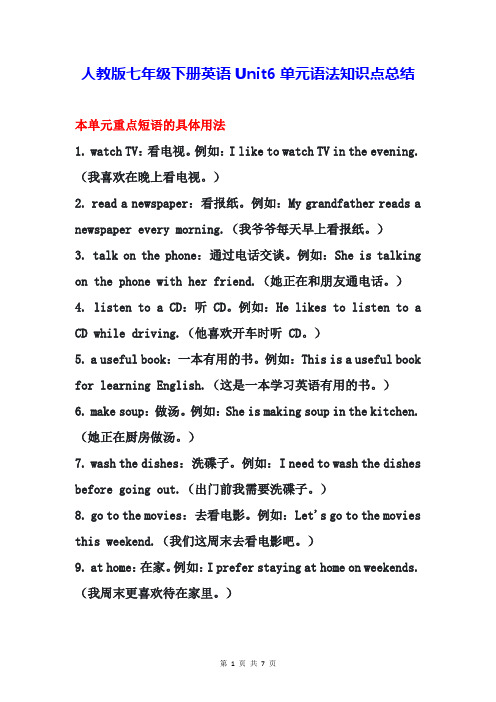
人教版七年级下册英语Unit6单元语法知识点总结本单元重点短语的具体用法1. watch TV:看电视。
例如:I like to watch TV in the evening.(我喜欢在晚上看电视。
)2. read a newspaper:看报纸。
例如:My grandfather reads a newspaper every morning.(我爷爷每天早上看报纸。
)3. talk on the phone:通过电话交谈。
例如:She is talking on the phone with her friend.(她正在和朋友通电话。
)4. listen to a CD:听 CD。
例如:He likes to listen to a CD while driving.(他喜欢开车时听 CD。
)5. a useful book:一本有用的书。
例如:This is a useful book for learning English.(这是一本学习英语有用的书。
)6. make soup:做汤。
例如:She is making soup in the kitchen.(她正在厨房做汤。
)7. wash the dishes:洗碟子。
例如:I need to wash the dishes before going out.(出门前我需要洗碟子。
)8. go to the movies:去看电影。
例如:Let's go to the movies this weekend.(我们这周末去看电影吧。
)9. at home:在家。
例如:I prefer staying at home on weekends.(我周末更喜欢待在家里。
)10. eat out:在外面吃。
例如:We often eat out on Fridays.(我们经常周五在外面吃饭。
)11. drink tea:喝茶。
unit 6【复习课件】七年级英语下册单元复习(人教版)
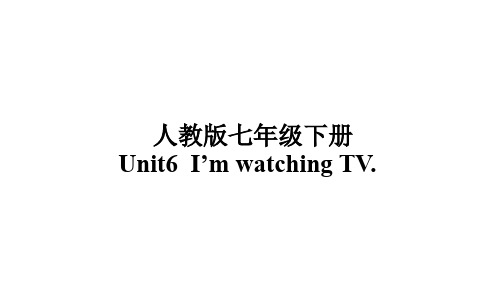
以ie 结尾的重读开音节词, 变ie为y+-ing
die-dying, lie-lying, tietying. . .
考点2 现在进行时的一些标志词或提示
考向1 题干中有look, listen, now 等标志词时用现在进行时。
Look! A cat is running to you.
看!一只猫正跑向你。 考题 —What’s that noise, Sam?
2. —___I_s_____ ____h__e___ ___r_e_a_d_i_n_ga newspaper?
他正在看报纸吗?
—__Y__e_s____, he _____i_s___. / _______N__o, he ________i_s.n’t
是的, 他在看。/ 不, 他没看。
3. —___I_s____ the man ___s_w__im__m__i_nign a river?
考题 — Sssh! Be quiet. I’m on the phone.
—Who _____B__ you _______ to, Mom?
A. do; speak
B. are; speaking
C. will; speak
D. have; spoken
考点3 现在进行时的特殊用法 考向1 【难点】现在进行时与always 连用, 表示反复出现或习
24. delicious adj. 可口的; 美味的→ ______d_e_l_ic_i_o_u__s_f_o_o美d食 25. race n. 竞赛→ ___i_n__a__r_a_c_e在比赛中
26. still adv. 还; 仍然
27. any adj. 任何的; 任一的→ _____a_n_y__o_n_任e 何一个
人教版英语七年级下册 Unit 6 I'm watching TV 词汇语法知识及练习

Unit 6 I’m watching TV.语法知识及练习一、单词详解1. newspaper n.报纸new adj.新的news n.新闻,不可数名词pape r n. 纸;纸张,不可数名词newspaper n. 报纸,可数名词,复数形式为newspapers2.read a newspaper 看报纸read a book看书e v.使用;运用useful adj.有用的useless adj.无用的use up用尽;用光4.soup n.汤(不可数名词)5.make soup 做汤6.wash v.洗wash clothes 洗衣服wash away冲走7.movie n.电影(复-movies)film n.电影(英)8. go to the movies 去电影院watch a movie看电影movie sta r 电影明星8.just adv.只是;恰好just now 刚刚10. eat out 出去吃饭11.house n.房子(复-houses)housework n.家务(不可数名词)12. drink v.喝 n.饮料drink表示饮料时,一般情况下是不可数名词,但是表示饮料的种类或者份数时,是可数名词。
drink water喝水 drink up喝光11.tea n.茶;茶叶(不可数名词)14. drink tea 喝茶15. tomorrow n.明天;未来(一般用于一般将来时)16. pool n.游泳池;水池(复-pools)swimming pool 游泳池16. shop v.购物 n.商店(复-shops)go shopping去购物17.supermarket n.超市(复-supermarkets)supe r adj.超级的 marke t n.市场18. man n.男人;人复数形式为men相似单词:woman 女人——women policeman 警察——policemen policewoman 女警察——policewomen Englishman 英国人——Englishmen Frenchman 法国人——Frenchmen19. race n.竞赛(复-races)20. host n.主人;东道主host family寄宿家庭21. study v.& n. 学习;研究study for a test为考试而学习study hard努力学习22. state n.州(复-states)23. the United States(of America)(abbr.the US,the USA)美国;美利坚合众国24.American adj.美国的;美洲的 n.美国人;美洲人复数形式为:Americans25. dragon n.龙(复-dragons)26. Dragon Boat Festival 端午节27. any adj.任何的;任一的 pron.任何;任一(既可以放在可数名词复数前,也可以放在不可数名词前)练习一:选用some或者any 填空1.Please bring_______notebooks.2.I don't want to do _______ work.3.Are there _______rules in your home?4.Would you like _______bread?28.other adj.另外的;其他的 pron.另外的人(或物)选用other、the other 、another、 others 或者 the others 填空1.I want to find _______ friends.2.There are fifty students in our class, some are boys, and _______ are girls.3.Are there _______rules in your home?4.I don't like this dress, I want _______ one.5.Lily enjoys helping _______ very much.6.I have two sisters, one is a nurse and _______ is a teacher.29. young adj.幼小的;年轻的old adj.年老的;旧的30.child n.儿童复数形式为:children Children’s Day儿童节31.miss v.怀念;思念;错过Miss小姐miss the bu s错过公共汽车 miss it怀念它32. wish v.希望make a wish许愿wish to do sth.希望做某事32.delicious adj.可口的;美味的deliciously adv.可口地33.still adv.还;仍然放在动词(一般时态的be动词除外)之前,助动词之后34.living room 客厅bedroom n. 卧室bathroom n.浴室kitchen n.厨房study n.书房三.重要短语Unit 6 I’m watching TV.课后练习题一、单项选择( )1. Mark________on the phone now.A.are talking B.is talkingC.talks D.talk( )2. —What are they doing? .—They’re ________the computer.A.to useing B.is usingC.using D.are using( )3. —Is she playing the violin? .— ________. She’s reading a newspaper.A.Yes, she is B.No, she isC. Yes, she isn’t D.No, she isn’t( )4. Xiaoming ________ books every day, but he ________ TV now.A.is reading watchesB.is reading is watchingC.reads watches D.reads is watching( )5. Listen!A bird _______in the tree.A.is singing B.singC.sings D. are singing( )6. —Are there ________ villagers in this small town—Yes, there are________villagers in this small town.A.some some B.any anyC.any some D.some any( )7. I like this restaurant, its food is ________.A.young B.badC.Delicious D.terrible( )8. Even though he is seventy years old, he ________wants to learn something new.A.still B.justC.either D.already( )9. —Could you please________ your clothes?—Okay, Mom, I'll go right away.A.wishB.washC.wishes D.washes( )10. I also want ________vegetables and fruitsA.another B.the othersC.others D.other二、英汉互译1. 客厅 9. read a newpaper2. 寄宿家庭 10. use the computer3. 去看电影 11. eat out4. 做汤 12. wash the dishes5. 在电视上 13. Dragon Boat Festival6. 打电话 14. that’s sound good7. 美国 15. any other8. 我家人的照片 16. study for a test三、用所给词的适当形式填空1. Don't speak, your brother________(sleep).2. It’s 6 o’clock now.My mother________(make)breakfast for me.3.There are three _______(child)in my uncle’s home.4. I wish _______(finish)my homework quickly.5. My grandpa often _______(drink)tea.。
Unit6I'mwatchingTV词汇精讲和语法人教版七年级英语下册

Unit 6 I’m watching TV.词汇列表Group 1 日常活动newspaper/ˈnjuːzpeɪpə/use/juːz/v.使用;运用delicious/dɪˈlɪʃəs/adj.美味的soup/suːp/n.汤wash/wɒʃ/v.洗movie/ˈmuːvi/n.电影just/dʒʌst/adv.只是;恰巧eat out出去吃饭drink/drɪŋk/v.喝n.饮料tea/tiː/n.茶;茶叶pool/puːl/n.游泳池;水池race/reɪs/n.竞赛study/ˈstʌdi/学习;竞赛living room客厅house/haʊs/n.房子Group 2 招待客人tomorrow/təˈmɒrəʊ/adv.在明天host/həʊst/n.主人;东道主man/mæn/n.男人;人any/ˈeni/adj.任何的;任一的other/ˈʌðə/adj.另外的;其他的still/stɪl/adv.还;仍然young/jʌŋ/adj.幼小的;年轻的child/tʃaɪld/n.儿童miss/mɪs/v.怀念;私念;错过wish/wɪʃ/v.希望the United State美国;美利坚众和国词汇精讲1. drinkdrink tea 喝茶n.饮料。
一般为不可数名词,但是指饮料的种类或份数时为可数名词。
练习: In hot weather, you should _________ lots of water.A. drinkB. putC. makeD. let2. child复数形式为children儿童节Children’s Daye.g. In China, many families have only one child.’s day is on June 1st.练习:These ____________ (child) are watching TV in the classroom.3. study & learn(1)study v. &n.学习;研究。
人教版 七年级英语 下册 unit6_I'm_watching_TV_第六单元语法内容

watch play do have see talk run begin listen
watching playing doing haveing
seeing
talking running beginning listening
clean sing write be eat read swim open paint
Let’s guess what are they doing?
Is Tom doing homework? No, he isn’t. he’s drawing.
Let’s guess what are they doing?
Is Bill doing homework? No, he isn’t. he’s eating dinner.
4)--ie结尾变成—y 如: die---dying lie----lying
重读闭音节三要素:
1. 必须是重读音节; 2. 最后只有一个辅音字母; 3.元音字母发短元音
口诀: 一直加,二去e, 三要双写,四注意,
y代替ie。 做谓语,前加be, 正在进行记心里
I believe you can make the “ing” forms
他总是上课迟到而且课堂上经常打瞌睡。
⑵现时的情况或状态
They live in the same building . 他们同住一幢楼. She knows several languages.她懂几国语言.
The soup tastes good .这汤味道很好. They like skating .他们喜欢溜冰. He is a law student .他是学法律. ⑶永恒的真理 The sun rises in the east and sets down in the west. 太是从 东边升起, 从西边落下。 It snows in winter. 冬天下雪.
人教版七年级下册英语Unit 5 --6知识点语法归纳总结
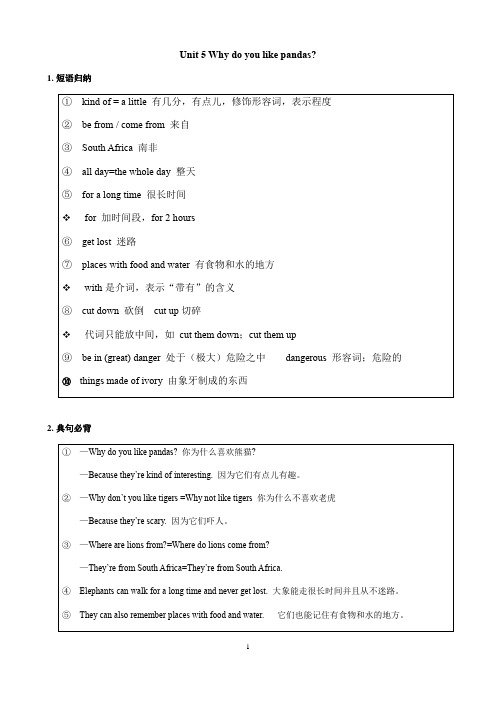
Unit 5 Why do you like pandas?1.短语归纳2.典句必背3.用法集萃(1)Well, because she’s kind of boring. 嗯,因为她有点儿无聊❖kind of意为“稍微;有点儿”,用来修饰形容词或副词,表示程度,和a bit, a little, a little bit意义相同。
例:The monkey is kind of cute. 那只猴子有点儿可爱❖含有kind的短语还有:牛刀小试There are many ______ animals in the zoo. Most of them are _______ cute.A.kind of; kind ofB.kinds of; kind ofC.kinds of; kinds ofD.kind of; kinds of(2)She sleeps all day, and her name is Lazy. 她整天睡觉,她的名字叫Lazy❖sleep可以作动词,也可以作名词,意为“睡觉”。
例:It’s time to sleep. 该睡觉了I sometimes have a sleep in the afternoon. 我有时下午睡觉❖派生词:sleepy adj.困乏的;想睡的asleep adj. 睡着的(fall asleep 入睡;睡着)牛刀小试Paul stayed up late to watch the soccer game last night and now he feels very_______ .A.sleep B . asleep C.sleepy(3)I don’t like cats because they’re lazy. 我不喜欢猫,因为它们很懒❖lazy作形容词,意为“懒散的;懒惰的”。
例:The boy is lazy and he never gets up early on weekends.❖反义词:hard-working adj. 勤奋的;勤勉的(4)People say that “an elephant never forgets”. 人们常说“大象从不忘记”❖辨析:forget to do sth.;forget doing sth.牛刀小试Don’t forget _____ your hands before you have dinner.A.to washB. washingC. washD. washes(5)Elephants can walk for a long time and never get lost. 大象能够长时间行走,而且从不迷路❖lost 作为形容词,意为“走失的,迷路的,失散的”或者“丢失的,遗失的”;常与系动词be或者get连用,表示“丢失,走失,迷路”。
人教版初一七年级英语(下)第六单元Unit6知识点、语法+练习题、测试
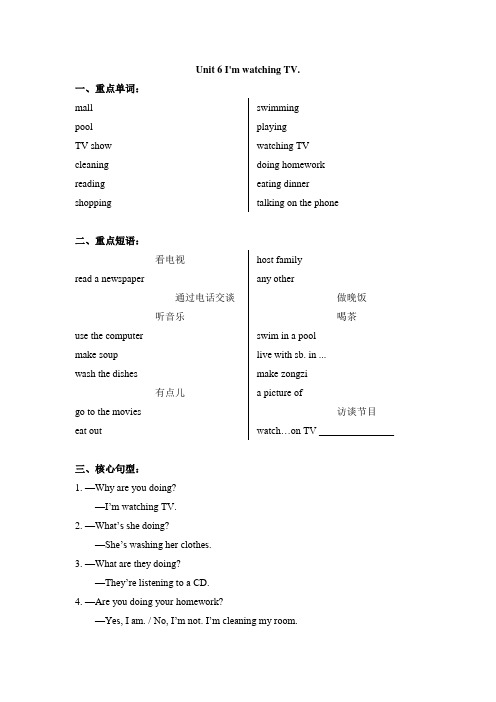
Unit 6 I'm watching TV.一、重点单词:mall _______________ pool _______________TV show _______________ cleaning _______________ reading _______________ shopping _______________ swimming _______________playing _______________watching TV _______________ doing homework _______________ eating dinner _______________ talking on the phone _______________二、重点短语:_______________ 看电视read a newspaper _______________ ___________________ 通过电话交谈_______________ 听音乐use the computer _______________ make soup_______________wash the dishes ______________________________ 有点儿go to the movies _______________ eat out _______________ host family _______________any other ______________________________ 做晚饭_______________ 喝茶swim in a pool _______________ live with sb. in ... _______________ make zongzi _______________a picture of ______________________________ 访谈节目watch…on TV _______________三、核心句型:1. —Why are you doing?—I’m watching TV.2. —What’s she doing?—She’s washing her clothes.3. —What are they doing?—They’re listening to a CD.4. —Are you doing your homework?—Yes, I am. / No, I’m not. I’m cleaning my room.5. Zhu Hui misses his family and wishes to have his mom’s delicious zongzi.四、重点语法:现在进行时:①定义:现在进行时态主要用于表示现在正在进行的动作,有时也可表示现阶段正在进行的动作。
Unit6SectionAGrammarfocus-3c课件人教版七年级英语下册

Translate 1.我每天早上读英语。
I我re在ad读E英n语gli。sh every morning. 2.我I a不m喜r欢ea看di电ng视E。nglish now.
I don’t like watching TV. 我不在看电视。 I’m not watching TV now.
3.你每天六点起床吗? Do you get up at six every day? 你在起床吗? Are you getting up now?
drink water 喝水 drink coffee 喝咖啡 drink beer 喝啤酒
其他“喝”的英文表达: have milk / tea 喝牛奶 / 茶 take / have coffee 喝咖啡 have / eat porridge / soup 喝粥 / 汤
【语境应用】完成句子。 1) 早餐喝牛奶怎么样? / having milk
(walk) in the park.
现在进行时与一般现在时态的区别
I usually sleep at nine in the morning. But I’m playing soccer at nine this morning. I often _u_s_e_t_h_e__c_o_m_p_u_t_e_r_a_t__1_0_:0_0____. But _I’_m__r_e_a_d_i_n_g_a__b_o_o_k_n__o_w__.
We need to ___d_r_in_k____ ___w_a_t_e_r___ every day.
She’s talking on the phone. He’s washing the dishes. She’s using the computer. She’s exercising. He is getting up. He is running. The cat is dying.
Unit6复习课件2021-2022学年人教版七年级英语下册
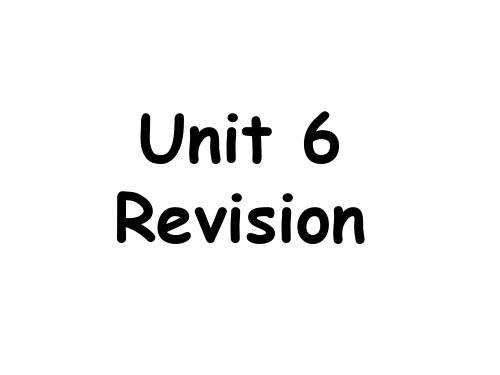
Cindy: Oh, no , they’re not _h_e_a_l_th_y_(health) I _l_ik_e_(like) chicken for dinner.
David: OK ,well, one last question--- do you eat ice-cream_a_f_te_r(…后)
dinner. Cindy: I like ice cream…but I d_o_n_’_t _ea_t (not eat) it. I don’t want __t_o_ _b_e__ (be)fat.
4. eat well
5. 考虑
5. think about
6. 吃早/午/晚饭
6. have
7. 体育明星
breakfast/lunch/dinner
8. 排球明星
7. sports stars
9. 问某人某事
8. the volleyball star
10. 喜欢汉堡包/冰淇淋 9. ask sb. about sth.
David _a_sk_s_(ask) the volleyball star, Cindy Smith, a_b__ou_ther _e_a_t_in__g (eat) habits.
David: Hello ,Cindy. What do you like __fo_r_ (对于…而言) breakfast? Cindy: I __lo_v_e__ (love)fruit . I think it’s_h_e_a_lt_h_y(health). David: OK . So what _f_r_u_it(fruit)do you like? Do you like bananas?
- 1、下载文档前请自行甄别文档内容的完整性,平台不提供额外的编辑、内容补充、找答案等附加服务。
- 2、"仅部分预览"的文档,不可在线预览部分如存在完整性等问题,可反馈申请退款(可完整预览的文档不适用该条件!)。
- 3、如文档侵犯您的权益,请联系客服反馈,我们会尽快为您处理(人工客服工作时间:9:00-18:30)。
Unit 6 I’m watching TV.
Section A 语法讲解
语法-现在进行时
一、概念
表示现在(说话瞬间)或现阶段正在进行或发生的动作。
二、结构
(1)肯定句:主语+be+v-ing+其它
Eg:He is mending his bike.他正在修自行车。
(2)否定句:主语+be+not+v-ing+其它
Eg:He is not(isn't) doing his homework.他没在做作业。
(3)疑问句:主要分一般疑问句和特殊疑问句两种
一般疑问句把be动词提前:Be+主语+v-ing+其它?
特殊疑问句:疑问词+be+主语+v-ing+其它?
Eg:—Is he reading the book? 他正在读那本书吗?
—Yes,he is.(No,he isn't.)是的,他在修。
(不,他没在修。
)
What is he doing?他正在干什么?
三、用法
(1)以Look!或Listen!开头的句子,提示说话时动作正在进行,用现在进行时。
Eg:Look!The children are playing games over there.瞧!孩子们在那边做游戏。
Listen!Who's singing in the classroom?听!谁在教室里唱歌?
(2)当句子中有now(现在)时,表示说话时动作正在进行,常用现在进行时。
Eg:We are reading English now.现在我们正在读英语。
(3)描述图片中人物的动作时常用现在进行时,以示生动。
Eg:Look at the picture.The girl is swimming.看这幅图,这个女孩正在游泳。
(4)表示当前一段时间内的活动或现阶段正在进行的动作时常用现在进行时。
这时常与时间状语these days,this week等连用。
Eg:We are playing football these days.这些天我们在踢足球。
(5)有时句子中可能没有时间状语,但如果表示的是说话时或者现阶段正在进行的动作,就应该用现在进行时。
Eg:—What's Jim doing?—He is cleaning the room.
注意:是不是所有的动作都可以用现在进行时?
有一些表示状态、结果、感觉和感情的动词,如be(是),have(有),like(喜欢),love,hate(讨厌),need(需要), want(想要),know(知道),see(看见),hear(听见), find(找到、发现),remember,forget,think(认为),look(看起来)等,一般不用现在进行时。
Eg:I have a new bike now.现在我有一辆新的自行车。
四、有些动词的现在进行时表示近期按计划或安排要进行的动作。
这些动词是: go, come, leave, start, arrive, return, work, sleep, stay, play, do, have, wear, die等。
Eg: She's coming to see me tomorrow. 她明天要来看我。
The football match is starting next Monday. 足球赛在下星期一开始。
五、动词现在分词v-ing的构成:
1. 一般直接在动词末尾加-ing
play--playing, sing--singing,read-reading
2.以不发音的字母e结尾的动词,去e加-ing
have—having, make—making, come—coming, write—writing
3.以重读闭音节结尾,末尾只有一个辅音字母, 双写辅音字母再加-ing run—running, swim—swimming, shop-shopping,
sit—sitting, put—putting, get-getting
有一些特殊变化(或者说以ie为结尾的重读闭音节的动词)的现在分词(有3个): lie—lying, die―dying, tie ―tying,这些以ie结尾要去e再把i变y再加ing.。
